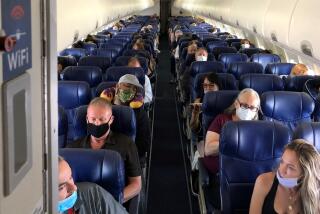Smoking and Flying
- Share via
I applaud the fact that the Los Angeles Times is keeping readers informed about the current debate concerning the proposal to ban smoking on U.S. commercial airline flights (“A Last Gasp for Smokers on Airliners” by Paul Dean, Aug. 2).
I was dismayed, however, to find that the story did not include important information about the issue that I believe you and your readers will find interesting.
Four studies of environmental tobacco smoke on airlines have been conducted during the last 16 years: a 1971 report from the Federal Aviation Administration, the Department of Health Education and Welfare and the National Institute of Occupational Safety and Health; a 1983 study by a team from San Francisco General Hospital Medical Center; a 1984 study by Japanese researchers; and a 1985-’87 study by R. J. Reynolds Tobacco Co. scientists.
All four studies have concluded that the environmental tobacco smoke levels during airline flights are extremely low.
The Reynolds Tobacco study, which was conducted on 75 flights of Boeing 727 and 737 aircraft, has been accepted for publication in Environmental Science and Technology, a journal of the American Chemical Society that publishes studies only after they have been reviewed by independent scientists with expertise in the subject matter.
Your story also points out that a National Research Council study in 1986 “unanimously and forcefully’ recommended a federal ban on smoking on all domestic commercial air flights.” The story does not mention the fact that the NRC study was commissioned by the U.S. Department of Transportation which chose not to act on the NRC’s recommendation (citing a need for further study).
Whether smokers should continue to enjoy the freedom to smoke on U.S. commercial airline flights is an issue that is, unfortunately, fraught with emotionalism. The only way the issue will be satisfactorily resolved is through further scientific research into smoke exposure levels and effects and through complete and accurate public information about the results of those studies.
G. ROBERT DI MARCO
Senior Vice President
Research and Development
The R. J. Reynolds Tobacco Co.
Winston-Salem, N.C.






